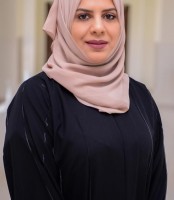
Dr Samya Al Memari obtained her Bachelor of Science in Nursing from Sharjah University in 2003 and in 2007 her Master’s in Quality Management from the University of Wollongong. In 2011 she completed her second Master’s degree in Public Health in Leadership and management of Health Care Systems in the Emirates of Abu Dhabi, from Johns Hopkins Bloomberg School of Public Health (JHSPH). In 2018 she competed her Doctoral Degree in Public Health from the same University.
Professionally, she has progressed through the nursing profession, starting from being a practical nurse to become Director of Nursing. She has worked in different units such as Medical, Surgical, VIP, ICU, and Dialysis, as a staff nurse. She also acted as a part-time instructor in the School of Medical Services at Zayed Military Hospital. She changed her work direction to nursing administration by first taking up the post of Head Nurse, then Medical/Surgical Assistant Chief Nurse, followed by Deputy Director of Nursing at Zayed Military Hospital. In 2012, she joined the National Rehabilitation Center, Abu Dhabi as Nursing Unit Manager and subsequently appointed Director of Nursing. In 2017, she was assigned to manage the Director-General’s Technical Office. In 2019 she was appointed Acting Medical Services Sector Director, in addition to her responsibilities in the DG’s Technical Office.
Dr Samya Al Memari is the Chair of the International Society of Addiction Professionals (ISSUP) UAE National Chapter and Eastern Mediterranean Deputy Regional President of the World Association of Psychiatric Rehabilitation (WAPR). She is also a member of a number of committees at the national level. During her career she has been an invited speaker at many conferences, particularly as an inspirational speaker to encourage young female Emirati professionals to take up leadership roles. She also has several publications.
Abstract
Addiction Nursing in The Arab world
Nurses constitute the vast majority of the mental health workforce in the Arab world, compared to psychiatrists, psychologists and social workers (WHO, 2018). Nurses are key professionals in drug and alcohol addiction treatment centres globally. Nurses are frequently the first professionals that patients with Substance Use Disorder (SUD) see in any health facility. In rehabilitation settings, nurses work as educators, counsellors as well as providing physical care. How nurses can be a key profession in delivering the public health agenda in tackling SUD will be outlined. The presentation explores the role of the nurse in SUD care and the workforce needs in the Arab region for trained nurses in the field. Ways of addressing the workforce gap and specializing nurses in addictions will be presented. The role nurses could play in opioid treatment, overdose prevention and harm reduction will be outlines. The need for nursing research in addictions and ways of advancing nursing research will be discussed. A regional strategy to develop addiction nursing with internationally recognised training will be suggested.
A cross-sectional study of smoking patterns of patients in treatment at the National Rehabilitation Center Abu Dhabi
Objectives
- To investigate smoking patterns among a clinical population receiving treatment at a specialized facility (NRC).
- To gather data about specific Tobacco products (Midwakh and Shisha) and their use.
- To study patient’s health knowledge and perceptions about the harms of Smoking.
Rationale
A previous study at the NRC found out that 98% of patients at the NRC smoke Tobacco. Due to such a high prevalence, this study aims to investigate the patterns, attitudes and health related knowledge of tobacco smoking among the clinical population.
Methodology
A survey questionnaire was developed based on the WHO Global Adult Tobacco Survey (GATS) alongside an Arabic version of the Hospital Anxiety and Depression scale (HADS).
Data were collected from 56 patients who volunteers to participate in the study.
Results
Preliminary analysis of the data will be presented with implications for intervention both in terms of prevention and treatment.